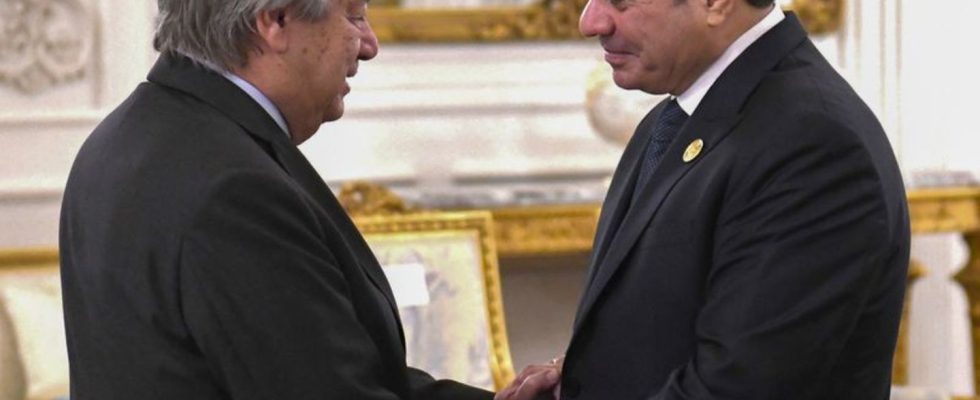“Peace Summit”
Cairo summit calls for a quick end to the Middle East war
Abdel Fattah el-Sissi (r), President of Egypt, welcomes Antonio Guterres, Secretary General of the United Nations. photo
© Uncredited/Egyptian Presidency Media Office/AP/dpa
Israel’s ground offensive in the Gaza Strip could begin in just a few days. In Egypt they hope to defuse the situation at least a little beforehand. But Israel is not at the “peace summit”.
A “summit for peace”, about 300 kilometers from Gaza Strip removed: Top politicians in Cairo used eloquent speeches to call for a quick end to the Gaza war.
At the summit, hosted by Egypt, there was sharp criticism of Israel’s attacks in the Gaza Strip as well as the terror of the Islamist Hamas ruling there. Federal Foreign Minister Annalena Baerbock – like other European representatives – pushed for the protection of civilians.
There was no hope of a detente at the conference, also because Israel was not invited. Meanwhile, a few aid deliveries for the people in need in the Gaza Strip began, but the heavy fighting continued.
King Abdullah II: “It is a war crime”
The “relentless bombardment in Gaza” is “cruel and ruthless at every level,” said Jordan’s King Abdullah II. “It is a collective punishment for a besieged and helpless population. It is a blatant breach of international humanitarian law. It is a war crime. ” Because the world is silent, the message to the Arab world is: “Palestinian lives are worth less than Israeli lives. Our lives are worth less than those of others.”
Egypt’s President and host Abdel Fattah al-Sisi assured that the Palestinians do not want to leave their country “even if they are bombed.” Palestinian President Mahmoud Abbas also said that these would hold out until the end. “We will never leave. We will never leave our land. We will stand tall on our land until the end.”
The summit was attended by several heads of state and government from the Middle East region as well as representatives of the UN and Western countries. Also sitting in the large hall were EU Council President Charles Michel and foreign ministers from Great Britain, France, Canada, Turkey and Brazil. The current situation is probably the biggest challenge of his “professional, personal and political life,” said British Foreign Minister James Cleverly.
Baerbock calls for consideration for the humanitarian situation
Baerbock called for “distinction between terrorists and the civilian population at all times.” The minister demanded that the fight against Hamas must be carried out with the greatest possible consideration for the humanitarian situation. The Green politician made it clear again: “For Germany, the security of the State of Israel is non-negotiable.” EU Council President Michel also said that civilians and their infrastructure in the Gaza Strip must be protected.
Only the opening of the Rafah border crossing for two or three hours was a brief ray of hope. The first aid deliveries for the civilian population in need began there from Egypt – according to the Egyptian Red Crescent, 20 trucks, mainly with food and medicine. These are the first deliveries via Rafah since the war between Israel and Hamas began two weeks ago. Recently, around 170 trucks with supplies had piled up on the Egyptian side in front of the crossing. Several countries want to increase their aid funds for the Palestinians, including Germany.
Guterres calls for a ceasefire in the Gaza Strip
UN Secretary-General António Guterres described the Palestinians’ complaints at the summit as legitimate. “We cannot and must not ignore the larger context of these tragic events: the long conflict and 56 years of occupation with no end in sight,” Guterres said. But nothing could “justify Hamas’s reprehensible attack.” Guterres called for a ceasefire in the Gaza Strip. The aim is to provide humanitarian aid for civilians there, the release of all hostages kidnapped from Israel and efforts to curb the violence.
The Islamist Hamas invaded Israeli border towns with hundreds of terrorists on October 7th and carried out a massacre with 1,400 deaths. A good 200 people were kidnapped as hostages in the Gaza Strip, including Germans. Israel imposed a blockade on the Gaza Strip after the Hamas attacks and has been bombing targets there ever since. According to the latest information from the Hamas-controlled Ministry of Health in the Gaza Strip, at least 4,137 people died in the attacks.

